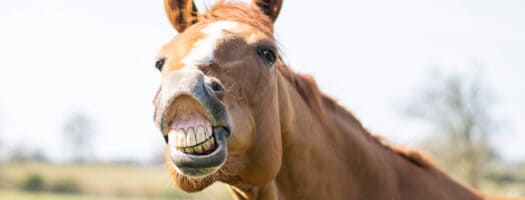Low-Maintenance Exotic Pets

Exotic pets are those that many individuals wonder about, as the list of exotic pets often includes unique animals like snakes, sugar gliders, reptiles, and chinchillas, among many others.
While exotic pets range in their size and care needs, some species are more low maintenance than others. If you’re looking for a non-traditional pet to care for, take a look at our list of exotic pets that might be easier to care for than other unique animals.
What Is Considered an Exotic Pet?
Exotic pets are pets that aren’t commonly seen living in our homes and apartments, as they are a more non-traditional addition to a family than pets such as a cat or a dog. Exotic pets are those that require different types of care and are more specialized, though they might be better options for individuals who aren’t interested in adding a dog or cat to their family.
In many cases, exotic pets can be contained in their own aquariums, terrariums, or outdoor hutches. They won’t risk bringing damage to an apartment or other living space, though this is very species-dependent.
Can Exotic Pets Really Be Low Maintenance?
Some exotic pets can be low maintenance, but it really depends on the animal, their care needs, and their behavior or personality types. In general, the exotic animals on our list are relatively low maintenance, but you can expect that you might need to put about the same amount of care into your exotic pet as many individuals do for their cats or dogs.
Make sure that you are ready to make the commitment to feeding, cleaning, and otherwise caring for your exotic pet before purchasing one.
Popular Low-Maintenance Exotic Pets
The following exotic pets may be relatively low maintenance when compared to other exotic pets. However, it’s important to be aware of exactly the type of care that each species will need before you adopt them so you aren’t taken by surprise.
Tarantulas
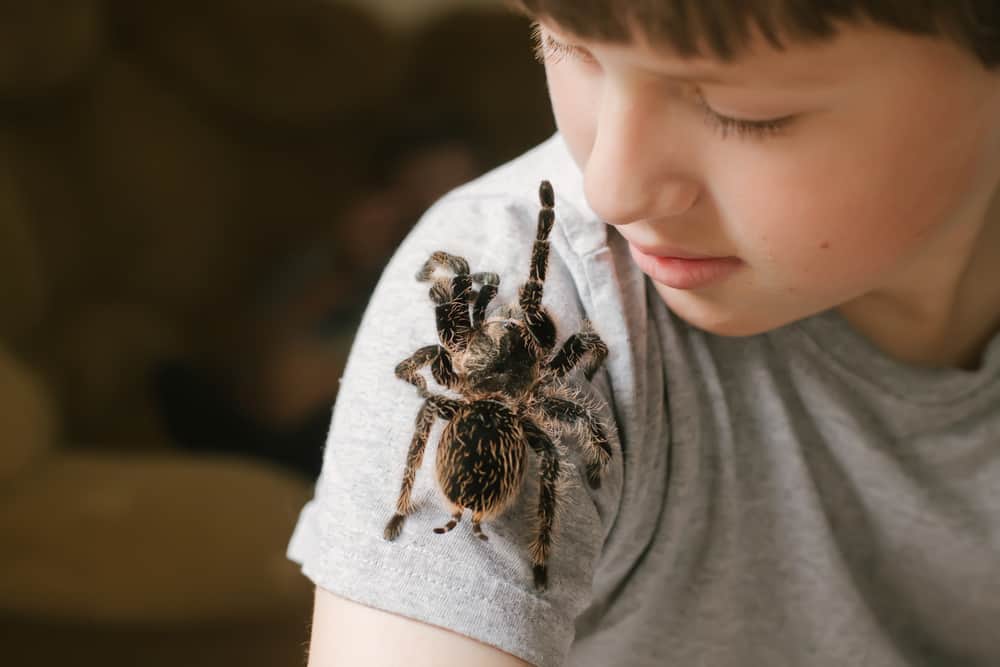
Though the size of these arachnids may be off-putting to some, tarantulas make good low-maintenance pets, and they are definitely in the category of exotic animals to own. The majority of caring for a tarantula includes giving regular feedings (once a week or a month, depending on size and species) and occasionally cleaning out their enclosure.
In terms of cost, you can expect to be caring for a tarantula for between two and twenty years depending on the species. The biggest upfront cost is the purchase of a tank for the spider and the spider itself. Make sure to purchase a tank of appropriate size based on your tarantula’s needs and equip it with lots of hiding spaces.
Some tarantulas may tolerate being handled, but others really prefer to keep to themselves. Conduct research on different tarantula species and how to handle them before investing in this exotic pet.
Chinchillas

Chinchillas are another low-maintenance exotic pet option, and they may often be seen as one of the cuddliest choices on our list, though it often takes them some time to warm up to being held by their owners.
Chinchillas are a type of rodent, and they are typically cared for in a sizeable cage. They need regular food and water, and a dust bath to roll around in. Like many other types of rodents, chinchillas will need safe items to chew and keep their constantly growing front teeth in shape.
It’s important to note that chinchillas are fairly social. It’s generally recommended that you adopt two at a time so they have someone to play with and spend their time with when you aren’t around. This pet also requires a fairly cool temperature, between 60 and 70 degrees Fahrenheit, as they have thick fur that doesn’t tolerate heat and humidity well.
Sugar Gliders
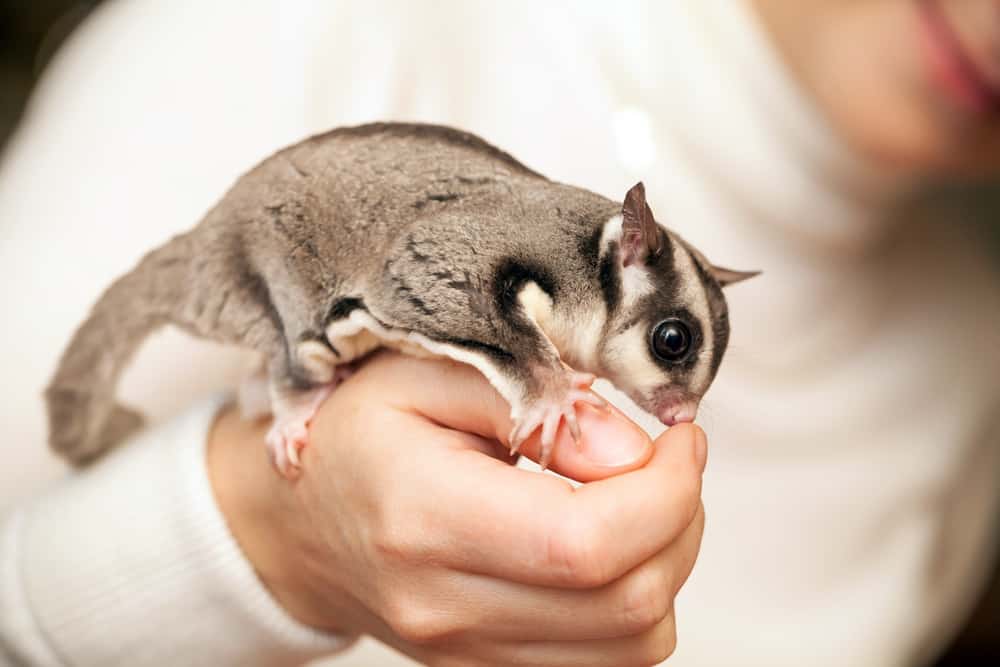
Sugar gliders look like squirrels but are more closely related to koalas by genetics, and they are both low maintenance and interactive with their owners. Sugar gliders need a high-protein diet to stay healthy, and they won’t require much human care in the form of cleaning.
Sugar gliders typically live in size-appropriate cages, and they require a warmer temperature, between 75 and 80 degrees Fahrenheit, to stay happy. Regular cage cleanings, toys, and fresh water help keep your sugar glider happy. This exotic pet is happy to stay in your pocket all day just to keep you company.
Hedgehogs
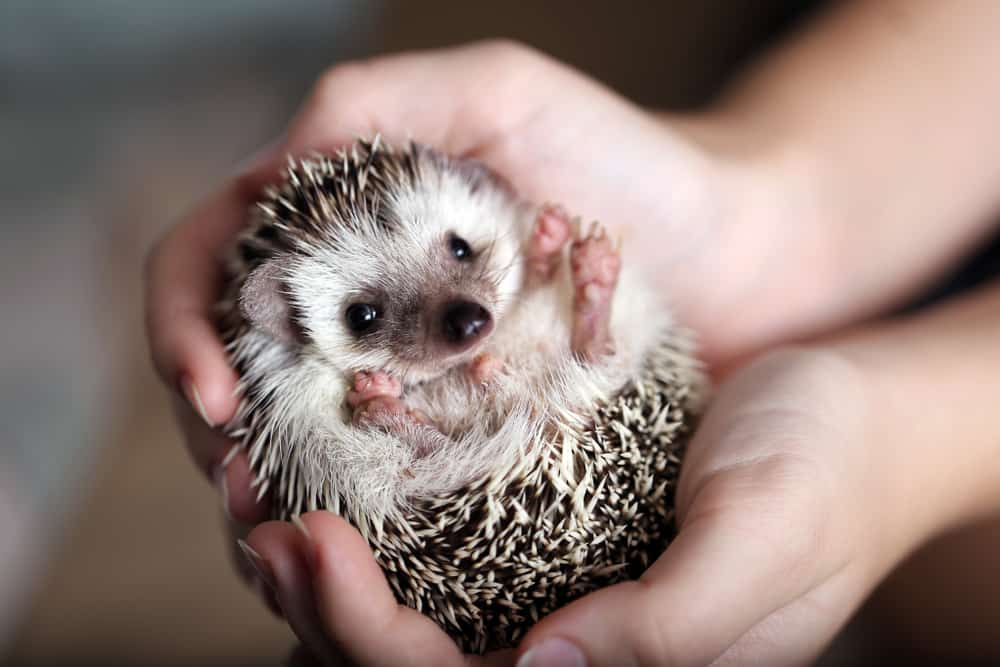
Hedgehogs are quickly gaining popularity as a low-maintenance, solitary, and cute exotic pet. Owners love the look of these animals and how they emit virtually no odor.
Hedgehogs need a comfortable cage to be happy, along with toys, fresh water, and regular feedings. You should expect to play with your hedgehog every so often and handle them regularly to ensure they are comfortable around you.
It’s important to note that care should be taken when handling hedgehogs because of their spiky quills. This exotic pet is not the best choice for being handled by children.
Hermit Crabs
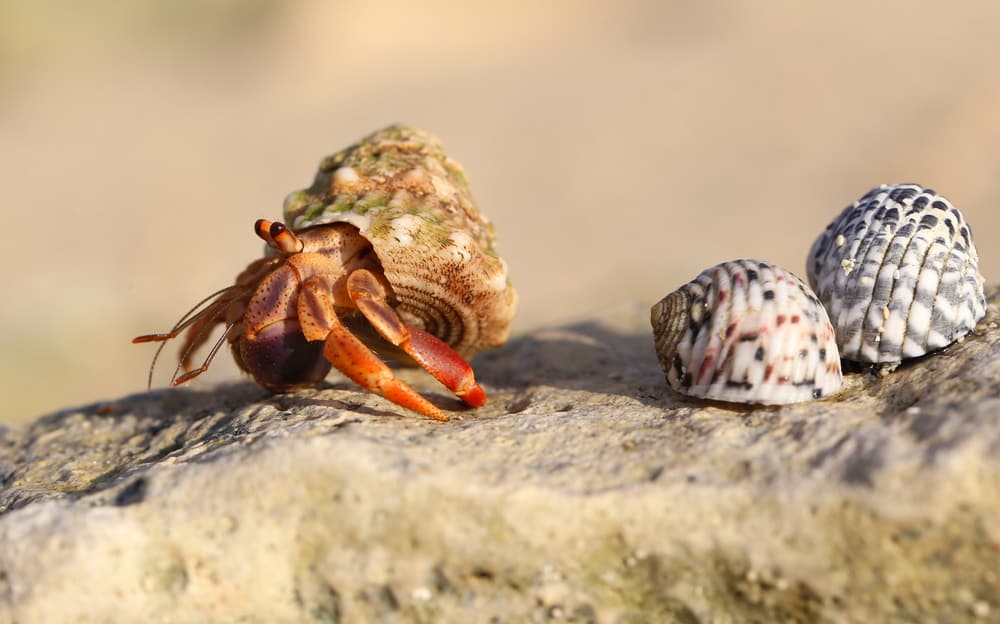
Hermit crabs are another quiet, low-odor, and low-maintenance exotic pet. These animals are social, and you should adopt two or more hermit crabs in order to keep these pets happy.
Hermit crabs find themselves at home in a tank of appropriate size with sand to bury themselves in. They must be allowed to bury themselves undisturbed for several weeks as they grow. You will need to provide habitat enrichment, food, water, and new shells for these animals to move into.
You can handle a hermit crab, but you should do so carefully and only when they are out and about – not buried under sand to grow. With proper care, hermit crabs may live up to ten years old.
Rats
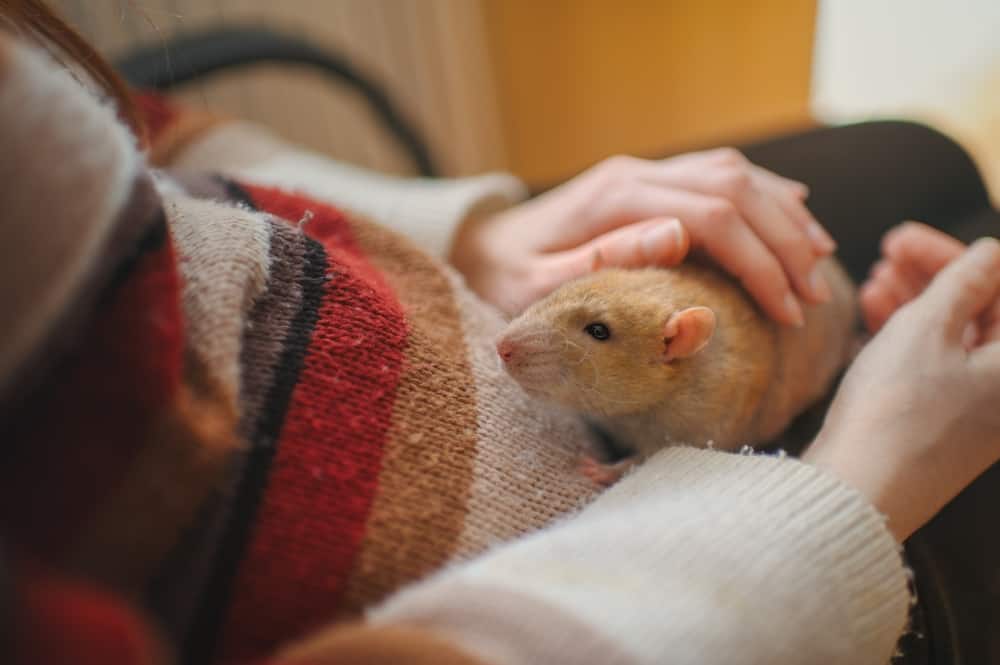
Pet rats might seem strange to some, but there are several species of domesticated rats that make wonderful low-maintenance exotic pets. These exotic critters don’t need a huge amount of space, but they do need ample toys to play with and mental stimulation. Adopting a pair of rats is often a good way to keep this animal happy, and necessary to ensure they are properly socialized.
Rats that are handled properly will often become friendly with their owners and enjoy running around with them for some extra playtime. They are also happy keeping to themselves when needed. Rats keep themselves clean, and they don’t require bathing. They do require regular feedings and water changes to stay healthy.
Fish
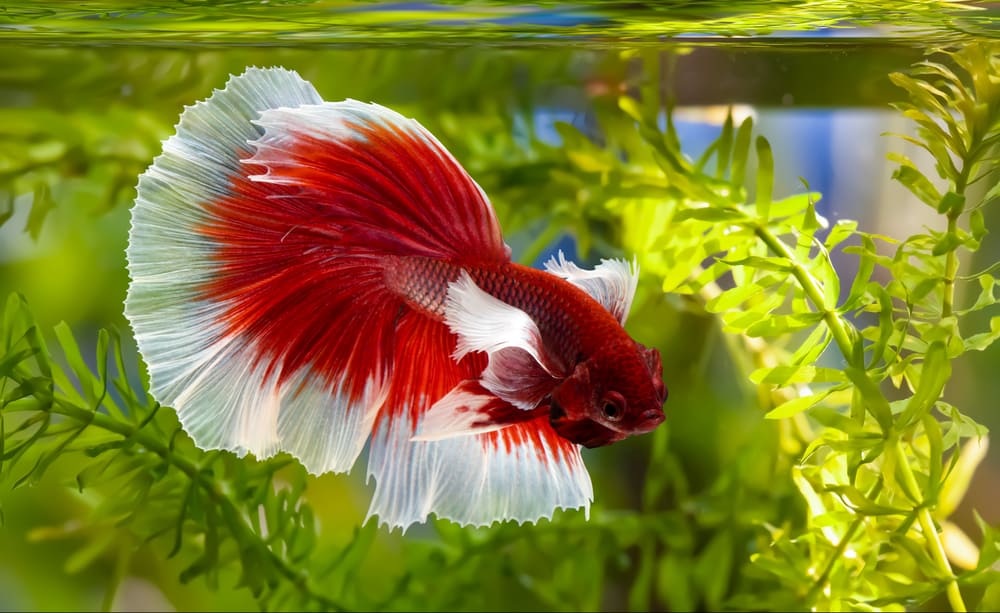
Fish are one of the most low-maintenance animals out there, but the upkeep and purchasing cost of fish often makes them one of the more expensive exotic pets you can purchase. Fish have different caretaking needs and tank requirements depending on the species – you can keep some fish in the same tank, while others would need to have their own living areas.
Make sure you invest in lots of vegetation for the tank and places to hide in addition to good filters that keep your fish friends’ environment healthy. Routine tank cleaning is required for these animals to stay happy and their water fresh.
Snakes
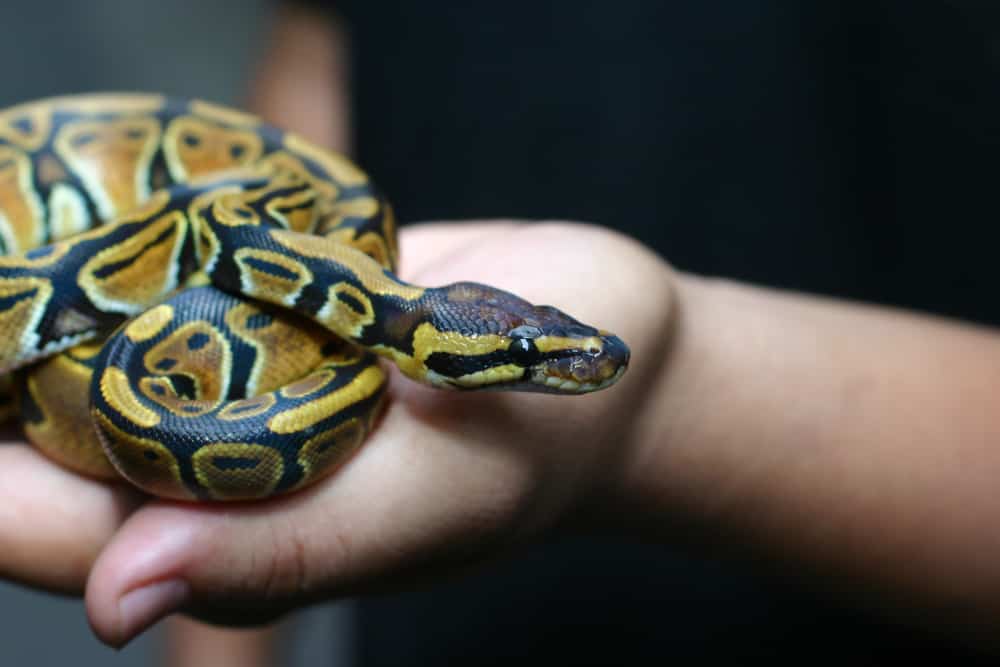
Some snakes may be low-maintenance exotic pets, but this does depend on the species you are purchasing. If you are interested in snake ownership, make sure to research good beginner-friendly species. This will help you find a snake that is more on the low-maintenance end and will be easier to handle and care for.
Snakes typically require routine feedings, a size-appropriate tank, items to hide under in their living environment, and a warm space. You will need to ensure your snake has ample fresh water. You don’t need to worry about excessive playtime or handling with a snake – they’re usually happy to keep to themselves in their comfortable living environment.
Things to Keep In Mind When Considering an Exotic Pet
As you start researching exotic pets to add to your family, it’s important to consider the following to ensure that you and your exotic pet are able to live happily and healthily together. Keep these things in mind as you do your research.
State Laws and Regulations
One of the most important things to keep in mind when considering an exotic pet is state and county laws.
Depending on your area, there may be restrictions on which animals may be kept as a pet and how exotic pets are cared for. Some states or counties may require certain space requirements or that your home is located in a specific area before you are allowed to legally own an exotic pet.
You can check which exotic pets are illegal to own in the county and other regulations, including licensing regulations, by visiting your state’s government website. You can also check with the U.S. Fish and Wildlife’s federal list of regulations and laws.
Available Veterinary Care
Exotic pets often require specialized care, and a typical vet that specializes in cats and dogs likely won’t be able to help you if your lizard or sugar glider is appearing under the weather.
Make sure that you investigate which vets near you are able to provide medical care to your exotic pet if needed. Take into account any costs associated with the vet or traveling to the vet – as a responsible pet owner, you must prepare to pay for these items should your exotic pet need medical care.
Finances
Exotic pets typically aren’t the cheapest, and you will need to plan for everything from purchasing costs and ongoing care, to medical care and one-off expenses. Exotic pets are a commitment, as are all pets, for the duration of the animal’s life, and you should be sure that you can afford to support your exotic pet and ensure they live as happily and healthily as possible.
Time and Care Commitments
Exotic pets have different requirements than common pets, and you may have to put more time and species-specific care into an exotic pet.
It’s important that you understand how much time caring for your exotic pet will take so that you can evaluate whether or not proper care commitments fit into your lifestyle and daily schedule. Again, you must think about this before adopting an exotic pet to ensure they are the right fit for your home.
FAQs About Low-Maintenance Exotic Pets
Low-maintenance exotic pets are often thought of as a unique way to add a new family member into your life. However, it’s important that you learn everything you can about your pet. Our answers to frequently asked questions regarding low-maintenance exotic pets help you get started.
Where Can I Buy an Exotic Pet?
Purchasing an exotic pet is not something to take lightly, as it often takes significant research and careful planning to ensure you are purchasing an exotic pet from somewhere reputable.
In your area, there may be reptile-specific shops, stores that specialize in exotic pets, or other pet supply stores where you can find your new friend. You may be able to re-home an exotic pet that someone is posting online, but you should be very careful that you don’t end up purchasing from a backyard breeder or another illegal operation.
Always double-check reviews and testimonies from other customers when possible. Speak with your local exotic pet and animal care community for recommendations, and consider talking with a veterinarian about the best places to purchase your exotic pet.
What Animals Don’t Make Good Exotic Pets?
Animals that don’t make for good exotic pets include wild animals, animals that aren’t legal to own. Animals that require an intense level of care and space to be happy, such as big cats, primates, or non-domesticated canines, also don’t make good pets.
While many of these animals may be considered cute and even cuddly, the majority of them need very specific levels of care that would be a burden on a regular individual. Not to mention, all of them require specific handling that ensures safety for both the individual and the pet.
It’s very important that you don’t violate state laws or keep exotic animals in unsafe conditions and conditions that don’t allow the animals to be their happiest. This will result in serious legal issues for you and major, sometimes fatal, problems for the animal.
How Do I Care For My Exotic Pet?
Every exotic pet, even the low-maintenance ones, has certain points of care they need to be completed if they are to be happy.
It’s up to you as a potential owner to figure out the best ways to care for your exotic pet before you bring them into your home. This is step one in preparedness and figuring out if you can easily adapt an exotic pet into your lifestyle and ensure they remain their happiest.
If you have concerns about caring for your exotic pet, speak to a veterinarian that specializes in the type of animal you are interested in adopting. Along with this, conduct research on reputable websites to ensure that you are up-to-date with the most recent care recommendations.
Can I Have Exotic Pets in an Apartment?
You may be able to have exotic pets in an apartment, but this depends on state and county laws, apartment building regulations, and the type of space you need for your animal.
Animals such as fish or lizards that are easily contained in their own aquarium or terrarium are often easier to live with in an apartment. On the other hand, an animal such as a rabbit or a ferret might smell a little too much for small indoor spaces and need extensive areas to run and play so that they are exercised and happy.
Make sure to consider all apartment rules and take space into consideration when you are deciding which exotic pet you might want to adopt.
Are Exotic Pets Easy to Own?
Exotic pets, including low-maintenance ones, may not be the easiest to own. They are considered exotic for a reason, and they are not commonly seen around homes or apartments.
However, some exotic pets do have relatively lower needs for socialization, feeding, and general caretaking. This might make them more of an option if you are searching for a unique pet that won’t require an extensive amount of effort to keep happy.
You must consider that any exotic pet will likely be more work than a common pet, such as a cat or dog. Be sure that you are prepared to commit any time and money to keep your exotic pet in their best health.
Will My Exotic Pet Be Friendly?
Some exotic pets are friendly and bond with their owners, while others prefer to keep to themselves a bit more.
Whether your exotic pet is friendly depends on their personality and the species, but you can expect mammalian exotic pets to show some sort of happiness when spending time with you. The more social an animal is known to be, the higher the chance of them showing friendliness.
Which Exotic Pet Is Safest to Be Around?
If you want an exotic pet, but you want to be sure they are safe for you to take care of, you may want to invest in a rat, sugar glider, or fish. These pets are generally considered exotic, they are relatively low-maintenance, and they may be friendly or cuddly (with the exception of fish) from time to time.
Overall, the majority of exotic pets come with slight risks. It’s up to you to research the expected personalities of an exotic pet, their behaviors and care needs, and any risk factors associated with their care before you purchase one and begin your life together.
Properly Caring for Your Exotic Pet
Exotic pets are those that we don’t see commonly making appearances in people’s homes, but they are wonderful pets that many individuals may find joy in caring for. It’s important when considering an exotic pet that you understand the specifics of caring for them properly and how they might affect your lifestyle.
Exotic pets, even the low-maintenance ones, typically require a higher level or more dedicated care than common pets like cats and dogs. It’s essential that you work with an appropriate veterinarian and understand everything about your exotic pet in order to give it the best life possible.


